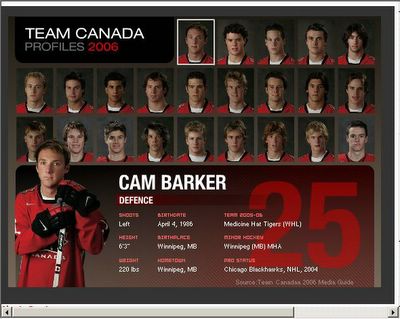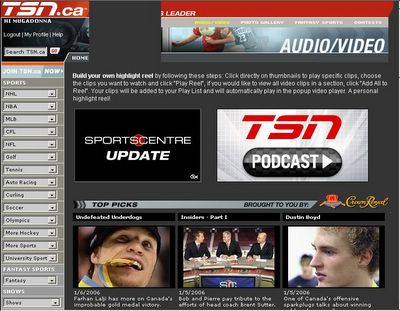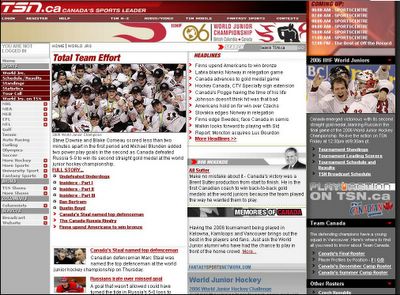Friday, January 06, 2006
Canadian Peewee, future Canadian Hockey Champ

 Canadian Hockey Fan
Canadian Hockey Fan"Hockey on Skating Rinks ~ Canada"
When you're the one invented Hockey, you're bound to play the game better at it than most.
The drop of the hockey puck on our skating rink faces off a sport played by peewees and pros alike, by French Canadians, by Aboriginal Canadians, by newly-landed Torontonians who chose Canada for their new home.
Hockey keeps the expansive terrain of Canada a tight community.
Justin Pogge, Canada's goalie
Canada Juniors Defend Gold-Medal
...with a 5-0 win over Russia
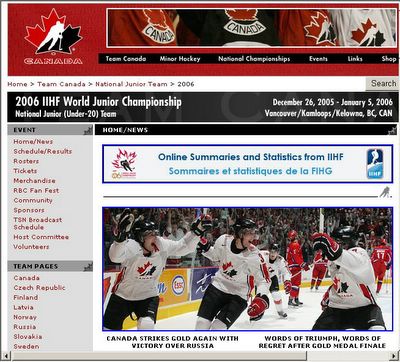
Canada -World Junior Hockey Champions
05/01/2006 11:39:00 PM
VANCOUVER (CP)
Brent Sutter did it again.
He navigated Canada to a second straight world junior hockey championship by demanding his team play a relentless defence. Canada shut down a Russian team considered more talented 5-0 in Thursday's final to defend the gold medal won last year in Grand Forks, N.D. The back-to-back titles are the first for Canada since 1996 and 1997 when the country completed a run of five straight. It was Canada's 12th title since the tournament's inception in 1974, and it was accomplished through Sutter's system of team defence - and great goaltending from Justin Pogge.
This was Canada's best defensive performance at a world junior championship with only six goals against in six games and only one at even strength.
"We had a great group of young men and they just stuck with it and stuck with it," Sutter said. "They've hung in there together and as they went along they got better and better.
"Going into the game, all you heard about was how skilled the Russians were and how good of a team they had and rightly so, but I think one thing everyone underestimated was the skill level we had on our team."
Sutter, the coach, general manager and owner of the WHL's Red Deer Rebels, is 12-0 in his two years at the helm of the national junior team. He's become the winningest Canadian coach in the history of this tournament.
"Brent's an intense guy," Canadian captain Kyle Chipchura said. "He's got the respect of everybody on this team. He kept our focus right and kept us the distractions out.
"He never let us off the hook, he never let us give up anything for free and if we did slack off a bit, he was right there telling us about it. He was huge for us."
Pogge collected his third shutout of the tournament. The goalie from the Calgary Hitmen stopped 35 shots and helped hold off Russia when it was outshooting Canada 15-3 in the early going.
Pogge tipped his new world-champion baseball cap to the crowd during the post-game celebration to acknowledge the regular chanting of this name throughout the game and the tournament.
"We had a slow start and he bailed us out again," Chipchura said.
Michael Blunden of the Erie Otters scored two power-play goals for his first two goals of the tournament. Blake Comeau of the Kelowna Rockets, Steve Downie of the Peterborough Petes and Chipchura of the Prince Albert Raiders had a goal each in front of a full house at GM Place.
Medicine Hat Tigers defenceman Cam Barker had two assists. Barker was the only player on the team to get a second gold medal. He couldn't play in last year's final because mononucleosis.
Sutter's philosophy of an aggressive defence, hard work and attention to detail proved successful with both the star-studded team that won last year and this squad, which was considered an underdog because it was younger, more inexperienced and less talented.
Russia did not get good goaltending from Anton Khudobin as he showed poor technique on Canada's first two goals.
"Those first two goals were decisive," Russian coach Sergey Mikhalev said. "We were not able to outplay the great defence of Team Canada and their goaltender.
"It's the first time in the tournament our team was not able to score."
Canada worked harder and was more willing to pay the physical price around the Russian net than the Russians were in defending it.
Canada's special teams were better with two goals on seven power-play chances while holding Russia scoreless on six opportunities.
Russia outshot Canada 15-8 in the opening 20 minutes, but the Canadians emerged with a 2-0 lead on goals by Comeau and Downie. They were also buoyed by the defensive effort of Marc Staal, who shut down Russian star Evgeni Malkin, and Pogge, who made some tricky saves during three Russian power plays.
Television replays in the opening two minutes of the second period showed the puck getting across the goal-line behind Pogge on a shot by Russian Nikolai Lemtyugov. The Russians had a long discussion with American referee Brian Thul, but the score remained 2-0.
Mikhalev said had that goal been recognized, the complexion of the game would have changed.
"Team Canada would have played differently," he said.
Sutter disagreed.
"We would have not changed our game plan if the Russians had scored one goal," he said.
The 2006 world junior hockey championship held in Vancouver, Kelowna and Kamloops, B.C. shattered the previous attendance record of 242,173 set in Halifax in 2003.
Official attendance was announced at 325,138 although ticket sales were said to be over 400,000.
The spectators at both Pacific Coliseum and GM Place in Vancouver were loud as expected. In addition to cheering for Canada, they adopted whichever country played the U.S., particularly when they cheered for Russia in the semifinal between the two countries.
But the chanting of few spectators became boorish with "U.S. sucks" in the semifinal and "over-rated" in the bronze-medal game.
It contrasted with the Halifax tournament in which the U.S. goaltender got a standing ovation for his performance following a semifinal loss to Canada.
It wasn't until Thursday's gold-medal final that the home-team support reached the spine-tingling levels that Halifax and Winnipeg in 1999 had throughout their tournaments.
There were empty seats in the corporate section in the lower bowl for all of Canada's games, including the gold-medal game, perhaps due to the 4 p.m. local start times.
The 2007 world junior hockey championship will be held in Leksand and Mora, Sweden.
The good news for the Canadian junior team is there are 12 players eligible to return and the bad news is that some of them will be playing in the NHL and unavailable to represent their country again at the international under-20 level.
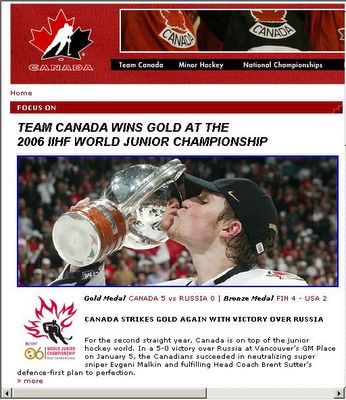
Canada -WorldJuniorHockeyChampions

Canada -World Junior Hockey Champions

05/01/2006 11:39:00 PM
VANCOUVER (CP)
Brent Sutter did it again.
He navigated Canada to a second straight world junior hockey championship by demanding his team play a relentless defence. Canada shut down a Russian team considered more talented 5-0 in Thursday's final to defend the gold medal won last year in Grand Forks, N.D. The back-to-back titles are the first for Canada since 1996 and 1997 when the country completed a run of five straight. It was Canada's 12th title since the tournament's inception in 1974, and it was accomplished through Sutter's system of team defence - and great goaltending from Justin Pogge.
This was Canada's best defensive performance at a world junior championship with only six goals against in six games and only one at even strength.
"We had a great group of young men and they just stuck with it and stuck with it," Sutter said. "They've hung in there together and as they went along they got better and better.
"Going into the game, all you heard about was how skilled the Russians were and how good of a team they had and rightly so, but I think one thing everyone underestimated was the skill level we had on our team."
Sutter, the coach, general manager and owner of the WHL's Red Deer Rebels, is 12-0 in his two years at the helm of the national junior team. He's become the winningest Canadian coach in the history of this tournament.
"Brent's an intense guy," Canadian captain Kyle Chipchura said. "He's got the respect of everybody on this team. He kept our focus right and kept us the distractions out.
"He never let us off the hook, he never let us give up anything for free and if we did slack off a bit, he was right there telling us about it. He was huge for us."
Pogge collected his third shutout of the tournament. The goalie from the Calgary Hitmen stopped 35 shots and helped hold off Russia when it was outshooting Canada 15-3 in the early going.
Pogge tipped his new world-champion baseball cap to the crowd during the post-game celebration to acknowledge the regular chanting of this name throughout the game and the tournament.
"We had a slow start and he bailed us out again," Chipchura said.
Michael Blunden of the Erie Otters scored two power-play goals for his first two goals of the tournament. Blake Comeau of the Kelowna Rockets, Steve Downie of the Peterborough Petes and Chipchura of the Prince Albert Raiders had a goal each in front of a full house at GM Place.
Medicine Hat Tigers defenceman Cam Barker had two assists. Barker was the only player on the team to get a second gold medal. He couldn't play in last year's final because mononucleosis.
Sutter's philosophy of an aggressive defence, hard work and attention to detail proved successful with both the star-studded team that won last year and this squad, which was considered an underdog because it was younger, more inexperienced and less talented.
Russia did not get good goaltending from Anton Khudobin as he showed poor technique on Canada's first two goals.
"Those first two goals were decisive," Russian coach Sergey Mikhalev said. "We were not able to outplay the great defence of Team Canada and their goaltender.
"It's the first time in the tournament our team was not able to score."
Canada worked harder and was more willing to pay the physical price around the Russian net than the Russians were in defending it.
Canada's special teams were better with two goals on seven power-play chances while holding Russia scoreless on six opportunities.
Russia outshot Canada 15-8 in the opening 20 minutes, but the Canadians emerged with a 2-0 lead on goals by Comeau and Downie. They were also buoyed by the defensive effort of Marc Staal, who shut down Russian star Evgeni Malkin, and Pogge, who made some tricky saves during three Russian power plays.
Television replays in the opening two minutes of the second period showed the puck getting across the goal-line behind Pogge on a shot by Russian Nikolai Lemtyugov. The Russians had a long discussion with American referee Brian Thul, but the score remained 2-0.
Mikhalev said had that goal been recognized, the complexion of the game would have changed.
"Team Canada would have played differently," he said.
Sutter disagreed.
"We would have not changed our game plan if the Russians had scored one goal," he said.
The 2006 world junior hockey championship held in Vancouver, Kelowna and Kamloops, B.C. shattered the previous attendance record of 242,173 set in Halifax in 2003.
Official attendance was announced at 325,138 although ticket sales were said to be over 400,000.
The spectators at both Pacific Coliseum and GM Place in Vancouver were loud as expected. In addition to cheering for Canada, they adopted whichever country played the U.S., particularly when they cheered for Russia in the semifinal between the two countries.
But the chanting of few spectators became boorish with "U.S. sucks" in the semifinal and "over-rated" in the bronze-medal game.
It contrasted with the Halifax tournament in which the U.S. goaltender got a standing ovation for his performance following a semifinal loss to Canada.
It wasn't until Thursday's gold-medal final that the home-team support reached the spine-tingling levels that Halifax and Winnipeg in 1999 had throughout their tournaments.
There were empty seats in the corporate section in the lower bowl for all of Canada's games, including the gold-medal game, perhaps due to the 4 p.m. local start times.
The 2007 world junior hockey championship will be held in Leksand and Mora, Sweden.
The good news for the Canadian junior team is there are 12 players eligible to return and the bad news is that some of them will be playing in the NHL and unavailable to represent their country again at the international under-20 level.

Canada -WorldJuniorHockeyChampions

TSN covers The World Junior Hockey Champions
Canada defeats Russia 5 - 0
REUTERS
By Roger Lajoie
Thu Jan 5, 10:21 PM ET
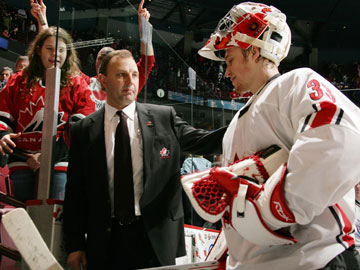
Canada -WorldJuniorHockey
VANCOUVER (Reuters)
Michael Blunden scored a pair of goals and Justin Pogge made 35 saves as Canada defeated Russia 5-0 in the championship game of the World Junior Hockey Championships Thursday.
Canada scored twice in the first period and twice in the second to set up the convincing win before a raucous sell-out crowd at GM Place, home of the NHL's Vancouver Canucks.
It was the Canadians' second consecutive gold medal and the 12th championship for Canada since 1977 at the men's under-20 event. Canada went a perfect 6-0 at the tournament.
"We came out and played our game and, oh my God, look what happens," Pogge, a Toronto Maple Leafs prospect, said. "We're in Canada and it's Canada game. The gold stays in Canada."
Finland took the bronze medal earlier in the day with a 4-2 win over the United States.
Blunden, a 2nd round draft pick of the Chicago Blackhawks, scored a pair of power play goals 2:42 apart in the second period to put the game away for Canada. Blake Comeau, a New York Islanders prospect, and Steve Downie, a 1st round selection of the Philadelphia Flyers, scored less than two minutes apart late in the first period for Canada.
Montreal Canadiens' 1st round draft pick Kyle Chipchura added Canada's final goal in the third period.
Pogge was especially sharp early in the first period when the Russians out-shot the Canadians 15-3 in the opening 15 minutes. Anton Khudobin played goal for Russia.
Jesse Joensuu scored a pair of goals for the Finns in their bronze medal win over the Americans, while Lauri Tukonen and Jari Sailio scored the others. Jack Johnson and Bobby Ryan replied for the USA.
NHL stars such as Wayne Gretzky, Mario Lemieux, Peter Forsberg, Jaromir Jagr and Markus Naslund have starred at this event in past years.
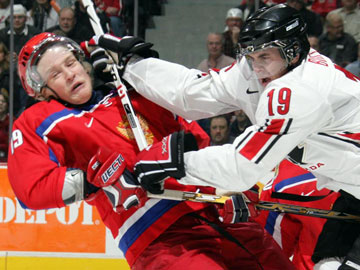
Canada -WorldJuniorHockey
By Roger Lajoie
Thu Jan 5, 10:21 PM ET

Canada -WorldJuniorHockey

VANCOUVER (Reuters)
Michael Blunden scored a pair of goals and Justin Pogge made 35 saves as Canada defeated Russia 5-0 in the championship game of the World Junior Hockey Championships Thursday.
Canada scored twice in the first period and twice in the second to set up the convincing win before a raucous sell-out crowd at GM Place, home of the NHL's Vancouver Canucks.
It was the Canadians' second consecutive gold medal and the 12th championship for Canada since 1977 at the men's under-20 event. Canada went a perfect 6-0 at the tournament.
"We came out and played our game and, oh my God, look what happens," Pogge, a Toronto Maple Leafs prospect, said. "We're in Canada and it's Canada game. The gold stays in Canada."
Finland took the bronze medal earlier in the day with a 4-2 win over the United States.
Blunden, a 2nd round draft pick of the Chicago Blackhawks, scored a pair of power play goals 2:42 apart in the second period to put the game away for Canada. Blake Comeau, a New York Islanders prospect, and Steve Downie, a 1st round selection of the Philadelphia Flyers, scored less than two minutes apart late in the first period for Canada.
Montreal Canadiens' 1st round draft pick Kyle Chipchura added Canada's final goal in the third period.
Pogge was especially sharp early in the first period when the Russians out-shot the Canadians 15-3 in the opening 15 minutes. Anton Khudobin played goal for Russia.
Jesse Joensuu scored a pair of goals for the Finns in their bronze medal win over the Americans, while Lauri Tukonen and Jari Sailio scored the others. Jack Johnson and Bobby Ryan replied for the USA.
NHL stars such as Wayne Gretzky, Mario Lemieux, Peter Forsberg, Jaromir Jagr and Markus Naslund have starred at this event in past years.

Canada -WorldJuniorHockey

Canada-Russia ~ World Junior Hockey
Canada-Russia showdown
04/01/2006 1:48:00 AM
VANCOUVER (CP)
VANCOUVER (CP)
Canada is making a habit of playing in the final of the world junior hockey championship and the 2006 team wants the country to start making a habit out of winning them again.
Canada beat Finland 4-0 in the semifinals Tuesday to advance to the gold-medal game against Russia, a 5-1 winner over the United States, on Thursday (TV, 7 p.m. ET). Canada will be going for gold in the world under-20 men's championship for the fifth straight year - four of them against Russia, including a 6-1 win last winter in Grand Forks, N.D.
The last back-to-back world junior titles for Canada were in 1996 and 1997, when the country capped a run of five straight.
"The whole country is watching and everyone is counting on us," said forward Blake Comeau. "There's also that pressure in the dressing room so, obviously, it's going to be a huge game for us.
"I think everyone is going to be disappointed if we don't end up getting what we want."
The Americans and the Finns play for bronze Thursday (TV, 3 p.m. ET).
Comeau scored a pivotal goal late in the second period to give Canada breathing space against Finland. Kris Russell of the Medicine Hat Tigers, Andrew Cogliano of the University of Michigan and Kris Letang of the Val-d'Or Foreurs scored for a Canadian team that dominated on defence.
Justin Pogge of the Calgary Hitmen stopped 19 shots for his second shutout of the tournament.
This Canadian team plays an aggressively defensive game for head coach Brent Sutter as last year's team also did under him.
Canada has given up six goals in its five games so far and only one of them was an even-strength goal.
"We've got a good chance of winning if we play the way that we have to and not give teams a whole lot," Comeau said.
Canada was the more rested team Tuesday because it had a bye to the semifinal, while Finland had less than 20 hours to recover from a 1-0 overtime win over Sweden on Monday when goaltender Tuuka Rask, a Toronto Maple Leafs draft pick, made 53 saves.
"We're disappointed, but not so much as some would think," Rask said. "Canada was the favourite heading into this game."
Canada fired 43 shots at Rask and pressured the Finns above the Canadian blue-line. The Finns were worn down by Canada's hard checks, including a couple of thunderbolts by defenceman Luc Bourdon, a Canucks draft pick, to the delight of the Vancouver crowd.
Michael Blunden steamrolled Erkka Leppanen behind the Finns' net early in the first period and Leppanen got up slowly after he was decked by Ryan O'Marra in the third period. O'Marra also hammered Tommi Leinonen midway through the third.
Rask held the Canadians off as long as he could, but the defence in front of him began to collapse. Russell scored late in the first and Comeau late in the second to give Canada momentum heading into the final period.
"You always want to come into the dressing room on a positive note and I thought we did a good job," Russell said. "We didn't get what we wanted right away but, if you just keep working hard, we did a good job of that and we were able to get those goals."
Finland took penalties out of fatigue, but Canada wasn't able to convert seven man-up chances in the first 40 minutes before Letang's power-play goal in the third.
Canadian penalty killers looked after the other side of the ledger and Finland didn't score on seven opportunities.
Cogliano, a speedster who has struggled scoring in this tournament, ended his drought by streaking down the wing and beating Rask over his shoulder with a high shot to cap the scoring at 13:32 of the third.
"It was good for me to get that goal and get some confidence," Cogliano said. "I can carry that confidence into the gold-medal game."
Pogge assisted on that goal and had GM Place chanting his name. Attendance was announced at a capacity 18,630, but there were several empty seats for a game that started at 4 p.m. local time.
Dustin Boyd provided some traffic for Letang's shot from the blue-line, that beat Rask glove-side to make it 3-0 for Canada at 9:40 of the third.
Comeau said Canada's goal was to get more traffic in front of Rask than the Swedes did and capitalize on second and third chances, which he did on his goal.
The New York Islanders draft pick caged his own rebound on a Marc Staal shot from the blue-line and waited for Rask to commit low before putting the puck around his outstretched pad to make it 2-0 at 18:58 of the second period.
Canada kept the Finns to the outside when they attacked. Pogge was in the right spot when Ryan Parent turned the puck over in front of him midway through the second period and Petteri Wirtanen got a quick shot away.
The Canadians wanted to take advantage of the Finland's short recovery and get on them early, but it wasn't until 18:16 that Russell broke the tension with the crucial first goal.
Benoit Pouliot found Boyd on the opposite boards and Boyd drove in on Rask's right, while Blunden cruised up the left. Russell, trailing the play, moved all alone into the slot and made good on Canada's first unchallenged shot of the period.
Canada went undefeated at 4-0-0 during the preliminary round and earned the bye to the semifinal by finishing first in Group A. Canada had opened the preliminary round with a 5-1 win over Finland on Dec. 26. Finland finished third in in Group A with a 2-2 record.
CP Player of the Game: Justin Pogge, who made 19 saves for the shutout. He made a huge save in the second period when Canada was up 1-0, had an assist, and made a lot of long, heads-up passes to get the puck out of Canada's zone.
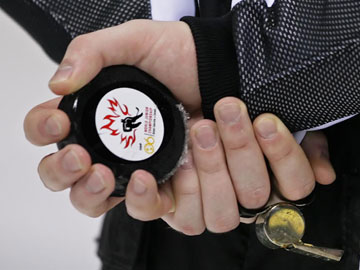
Canada -WorldJuniorHockey 2

Friday, January 07, 2005
''Hockey Day in Canada 2006''
CBC's Online Archives
take an affectionate look back at the grassroots of our game.
The Spirit of HockeyIn a vast and often frozen land, they are rituals that bind. Dark drives to a chilly hockey arena. Blades biting outdoor ice. Kids in heroes' sweaters, mouthing their own play-by-plays. CBC drives to the net with an unabashedly affectionate look back at the grassroots of our national game — the true spirit of hockey.
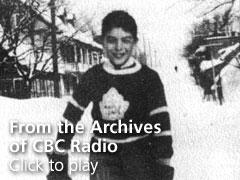
01
 The Hockey Sweater
The Hockey SweaterThe Hockey Sweater
It's Christmastime. On CBC Radio's Morningside, that means a visit by Roch Carrier, author of the beloved children's story The Hockey Sweater. In Quebec in the 1940s, hockey was a religion and the Montreal Canadiens star Maurice "Rocket" Richard was a god. 'The devil,' to little boys in Roch's village, lived in Toronto and wore the blue and white of the Toronto Maple Leafs. In this clip, Carrier gives a delightful reading of his tale of hockey heartbreak.
His Canadiens sweater — bearing Richard's No. 9, like all the other boys— has worn out. But when a new one arrives in the mail from Eaton's, he is horrified to see instead a Maple Leafs jersey. Roch tearfully swears to his uncomprehending mother: "I'll never wear that uniform!" But wear it he does. After the story, listeners get an extra treat. Gzowski reads his own boyhood hockey sweater story. Carrier then declares: "This is a great moment."
Roch Carrier is a celebrated French-Canadian writer. He was born in 1937 and raised in Sainte-Justine, Que., the setting of The Hockey Sweater. His best-known novel, La Guerre, Yes Sir! (1968), is a First World War tale of French-English relations. It was translated into English in 1970.
- CREDITS
Medium: Radio
Program: Morningside
Broadcast Date: Dec. 25, 1984
Host: Peter Gzowski
Guest(s): Roch Carrier
Duration: 19:19
Image of young Roch Carrier: from Libraries and Archives Canada, courtesy Roch Carrier's family.

02
 The birthplace of hockey?
The birthplace of hockey?The birthplace of hockey?
Howard Dill is hockey mad. But it's not the photos, pucks and pennants that bring skate-toting pilgrims to Dill's Windsor, N.S., farm. It's the ice out back. Long Pond, many believe, is where hockey was born 200 years ago when students put the Irish game of "hurley" on ice. But, as we see in this CBC Television clip, some question if it really is the pond. "There's only one Long Pond," says a defiant Dill.
Did You Know?
- Since this clip aired, debate has raged over where exactly hockey was born. Books have been published making the case for competing sites. Old novels, letters, paintings and even wooden pucks have been held up as evidence. The claim supporting Howard Dill's pond, or another in Windsor, N.S., competes with claims for sites including Dartmouth, N.S.; Montreal; Kingston, Ont.; Déline, N.W.T.; and New York State.
- Fuelling the debate is confusion over what exactly constitutes hockey. As far back as the 1500s, European ball-and-stick games were tried on ice, including hurley (also called hurly and hurling, an Irish game sometimes compared to lacrosse), cricket and shinty.
- The Society for International Hockey Research, formed in 2001, defines hockey as "a game played on an ice rink in which two opposing teams of skaters, using curved sticks, try to drive a small disc, ball or block into or through the opposite goals."
- The Windsor, N.S., claim is based on a novel, The Attaché, or, Sam Slick in England, by Windsor-born Thomas Chandler Haliburton. A character describes boys playing "hurly on the long pond on the ice," apparently voicing the author's early 1800s recollections of a hockey-like game played by students of King's College, now called University of King's College.
- The Society for International Hockey Research, made up of hockey historians, issued a 2002 report on hockey's origins that cast doubt on Windsor's claim. It said the literary passage is "not a satisfactory indication," that the activity described was hockey. The Society declined to offer an opinion on the birthplace of hockey. It noted, however, that the first eyewitness account of an organized game was at Montreal's Victoria Skating Rink on March 3, 1875.
- In February 2004, the Art Gallery of Nova Scotia trumpeted the find of an 1867 Henry Buckton Laurence lithograph depicting 10 skaters with curved sticks playing on ice at Dartmouth. The next month, however, researchers pointed to a painting made 32 years earlier by folk artist John Toole showing a similar scene with four players in the U.S. state of Virginia.
- Sir John Franklin, the Arctic explorer, wrote that his crew exercised by playing "hockey" on ice in Northwest Territories in 1825. And, in 1843, a British army officer wrote in his diary that he had learned to skate and play hockey on ice in Kingston in what is now Ontario. Around the same time, people in Halifax and Dartmouth were playing a game on skates called "wicket" or "ricket."
- In early forms of hockey, players were not allowed to pass the puck forward. The offside rule and the forerunner of the face-off, called a "bully," were adapted from rugby.
- As mentioned in the clip, Howard Dill is famous for more than his disputed claim to own the birthplace of hockey. He is also a grower of giant pumpkins, with four world titles under his belt. Although no longer competing, he sells Dill's Atlantic Giant seeds that have grown champion pumpkins for others.
- Since this clip aired, debate has raged over where exactly hockey was born. Books have been published making the case for competing sites. Old novels, letters, paintings and even wooden pucks have been held up as evidence. The claim supporting Howard Dill's pond, or another in Windsor, N.S., competes with claims for sites including Dartmouth, N.S.; Montreal; Kingston, Ont.; Déline, N.W.T.; and New York State.
CREDITS
Medium: Television
Program: Saturday Report
Broadcast Date: Feb. 24, 2001
Host: Suhana Marchand, Reporter: Phonse Jessome
Guest(s): Howard Dill, Garth Vaughan
Duration: 2:51
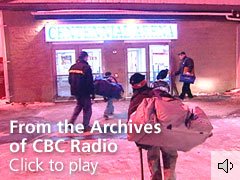
03
 Early Morning Practice
Early Morning PracticeEarly morning practice
On winter mornings, in homes across Canada, a weekend ritual begins with an alarm clock piercing the darkness. A sleepy child is coaxed into clothes. The car slowly warms while parent and player navigate icy roads to the arena. Sometimes you wonder "why on earth you do this," says Roy MacGregor, hockey dad and author of The Seven A.M. Practice: Stories of Family Life, in this clip from CBC Television's Midday.
A special bond is forged, MacGregor says, in those early hours. Paul Jordan, a Toronto hockey dad and coach with four boys, agrees. "I do it, not for the love of the game, but for the love of my children." Heather Haworth of Halifax loves the mornings and credits hockey with bringing her oldest boy out of his shell. They don't do it for the hockey-rink coffee, Jordan adds.
Did You Know?
- Roy MacGregor's 1995 non-fiction book, The Seven A.M. Practice: Stories of Family Life, is a collection of his newspaper columns. Many of the stories feature his own four children's adventures in amateur sports, including hockey. "People in this country need to know there is still a game out there, waiting," he wrote in one column.
- MacGregor is the author of several hockey books. They include Home Game: Hockey and Life in Canada (1989) written with former goaltending great Ken Dryden, and Home Team: Fathers, Sons & Hockey (1995). He has also written the popular Screech Owl book series about a fictitious minor hockey team. As a young boy in Huntsville, Ont., MacGregor often played against future NHL superstar Bobby Orr, who was on a team in nearby Parry Sound.
- Hockey mom and humorist Catherine Lawrence has joked that arena food is "a separate category in the Canada Food guide." The category, she told the Globe and Mail, "includes beef jerky, cheese glop from a pump bottle and stale buns."
CREDITS
Medium: Television
Program: Midday
Broadcast Date: Dec. 2, 1996
Host: Brent Bambury, Interviewer: Tina Srebotnjak
Guest(s): Heather Haworth, Paul Jordan, Roy MacGregor
Duration: 9:08
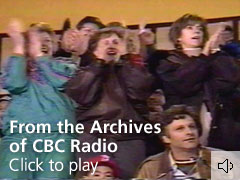
04
 Parents' Penalty - 12 Hours for Rushing
Parents' Penalty - 12 Hours for RushingParents' penalty: 12 hours for rushing
For the Davies family of Aurora, Ont., a typical Sunday morning is like the start of a military operation. On a table sits a black monthly planner. Inside are three colour-coded schedules — one for each boy — listing games and locations. Today, two of the boys also have referee duties in separate arenas. In this CBC Radio clip, a reporter rides shotgun with Joe and Lindsay Davies through an exhausting day of hockey that spans almost 12 hours and many kilometres.
What makes it all worthwhile, Lindsay says, is the bonds her sons are forming with teammates that "can lead to fantastic friendships."
Did You Know?
- In November, 2004, Don Cherry of Hockey Night in Canada told the Toronto Star newspaper: "Parents give up vacations, ruin their cars with travel and deprive themselves of many things for their kids' hockey. These are the best parents in the world. We separate the wheat from the chaff in the hockey world because if you are not serious about the game, you'll not put up with the expense, the effort or the time."
- In The Home Team: Hockey and Life in Canada, Ken Dryden and Roy MacGregor profiled Ed and Cathy Koehler. As parents of boys including an elite Triple-A player, they were expected to be at the rink four nights a week. Ed got so used to the ritual that, after his sons' teams got knocked out of the playoffs, he'd drive around "checking Toronto arenas for a game in progress."
- As well as books, hockey parents have inspired parody. In 1979 comedian Rick Moranis, who would later go on to fame in SCTV and Hollywood films, played a hockey dad in a skit on Don Harron's Morningside on CBC Radio. In the skit, he tells his daughter he saved "every stitch you ever took" and groans that his son won no hockey trophies — only a Governor General's Literary Award.
- Not everyone thinks the hectic hockey-family lifestyle is healthy. In 1999, parents formed a group called Family Life First in suburban Minneapolis. The group urges parents and coaches to cut back on activities including hockey to give families more time together at home. "Bragging rights are no longer how big your house or car is, but how busy your family is," Bill Doherty, a University of Minnesota social science professor, said in 2000.
- Many corporations are eager to be associated with grassroots hockey and its reputation as a wholesome family pastime. They include: - Campbell's Soup, which has run competitions to identify Canada's "most valuable hockey moms". - RBC Insurance, which has co-sponsored a program to recognize behind-the-scenes volunteers in minor hockey - Panasonic, which sponsored a "hometown hockey" exhibit at the Hockey Hall of Fame in Toronto.
CREDITS
Medium: Radio
Program: The Inside TrackBroadcast
Date: Dec. 18, 1994
Reporter: Greg KellyGuest(s): Joe Davies, Lindsay Davies
Duration: 12:07
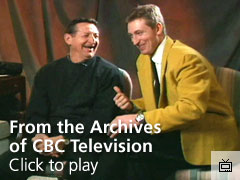
05 Canada's Hockey Dad

Canada's hockey dad
"Everything I am is because of him," declares Wayne Gretzky of his father, Walter. In this CBC Television clip, the world's most famous hockey player and the world's most famous hockey dad talk about the father-son bond that is rooted in Canada's national game. "I just think I told him to play good," Walter says. Wayne demurs. It was, the great son says, much more than that.
Walter knew his son wasn't big or fast so he encouraged him to anticipate the play and use his agility to get around bigger kids. He also told Wayne he had a special gift and, whether he applied it to hockey or something else, he shouldn't "blow it." Such lessons from Walter, Wayne says, made him more than a hockey player. "He taught me the basics of life."
Did You Know?
• The child of Ukrainian immigrants, Walter Gretzky was born in 1938 and worked as a Bell Canada repairman for 37 years in the southwestern Ontario town of Brantford. He was a talented hockey player but not big enough to play professionally. It has become Canadian hockey lore that he put skates on Wayne at age two and, a few years later, built a rink behind the family home for the budding prodigy.
For more on Wayne, see the Archives topic The Great Wayne Gretzky.
- In his 2001 book, Walter Gretzky: On Family, Hockey and Healing, Walter acknowledged that he was an obsessive hockey dad. He missed the birth of his fifth and final child, Brent, because he was at one of Wayne's tournaments. When he finally arrived at the hospital bed of his wife Phyllis, Walter exclaimed: "We won, we won!" She replied: "It's a boy, Walter."
- The "healing" part of the book title refers to Walter's long recovery from a 1991 stroke. Although he says he has vivid memories of Wayne's early childhood, he has no recollection of the period from the mid-1970s until the early 1990s — the period when his son won four Stanley Cups and re-wrote the NHL record books. For a while after his stroke, Walter had little or no interest in hockey and stopped staying up to watch Wayne's games on TV.
- By the time Wayne played his final NHL game in April 1999, Walter had returned to form. According to a New York Times story, at the game he hollered, "How did you miss that?" from the stands when his son muffed a shot in front of an open net. Moments later Walter yelled: "That's the way," after his son set up New York Rangers teammate Brian Leetch for a goal on the Pittsburgh Penguins.
- After that final game, Walter visited Wayne to tell him how proud he was. "When you're a son, you want to hear it," Gretzky said later with moist eyes. "He told me he was very proud of me."
- Walter wasn't a hockey dad just to Wayne. His son Brent played briefly for the Tampa Bay Lightning while another son, Keith, was drafted by, but never played for, the Buffalo Sabres. "Every thing my brothers and I learned about hockey, we learned from our dad," Brent said in 1999. "People ask me all the time what I learned from Wayne."
CREDITS
Medium: Television
Program: The Journal
Broadcast Date: May 14, 1996
Reporter: Laurie Brown
Guest(s): Walter Gretzky, Wayne Gretzky
Duration: 5:52

06 The skinny on shinny

The skinny on shinny
If hockey is our national sport, shinny is what spawned it, CBC Radio host Ralph Benmergui says in this clip. He rhapsodizes about hockey in its purest, original form with sport historian Paul Kitchen and Gerry Flahive, producer of the National Film Board's Shinny: The Hockey in All of Us. Kitchen, a past president of the Society for International Hockey Research, says the simple recipe for shinny is ice, sticks and a puck.
No rules — just plain fun," declares Kitchen, a shinny player for 55 of his 60 years. Flahive's favourite shinny enthusiast is an Australian woman he chanced upon in Banff. We hear Margaret Mitchell skating down the Bow River, doing her own imaginary play-by-play, just as countless Canadian kids have done. The Australian has, however, her own version of "He shoots, he scores!"
Did You Know?
- The Canadian Oxford Dictionary describes shinny as "informal pickup hockey usually played without nets, referees or equipment except for skates, sticks, and a ball or puck or an object serving as a puck." The word comes from shinty, a field hockey-type game from Scotland. See the clip The language of hockey for more on the game's lingo.
- While seemingly endless outdoor games of shinny are firmly planted in the Canadian psyche, its future is not so certain. A 2002 Canadian Press news story suggested the popularity of pickup hockey on both ice and road is on the wane. Hockey historian Paul Kitchen, who appears in this clip, told the wire service he had noticed a dramatic drop in the number of games in his city of Ottawa.
- In the Canadian Press story, Kitchen also said: "Today, there is more for kids to do — watching television and playing with computers," he says. "There is also more organized hockey now at the indoor community centres, so kids who want to play the game go through all that." Former NHL great Bobby Orr has also bemoaned the dropoff. "Take your street or a field with kids, without adults ... when was the last time you saw that?"
- To harken back to the days of outdoor hockey, the NHL in November 2003 staged the Heritage Classic in Edmonton — a two-game event that some nicknamed Shinny Night in Canada. Played outside in –20C chill, the games — one between current members of the Edmonton Oilers and Montreal Canadiens and another between past stars of the two teams — drew a record crowd of 57,167. The first outdoor NHL game, it was watched by another 2.7 million on TV.
- The National Film Board documentary Shinny: The Hockey in All of Us was broadcast on CBC. It later won the prestigious Rockie Award for best sports program at the 2002 Banff Television Festival, beating programs from around the world.
CREDITS
Medium: Radio
Program: This Morning
Broadcast Date: Jan. 2, 2002
Host: Ralph Benmergui
Guest(s): Gerry Flahive, Paul Kitchen
Duration: 8:31
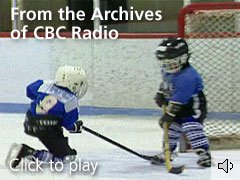
07 Hockey Gets Organized

Hockey gets organized
It's minor hockey week in Canada – "the world's greatest hockey spectacle." More than 125,000 youngsters will take part in events in towns and cities across the country. As we hear in this CBC Radio clip, the number of boys in organized hockey in the early '60s is growing rapidly. Jack Christie of the Canadian Amateur Hockey Association has some advice for parents: "To keep a boy out of hot water, put him on ice."
CBC's Online Archives
take an affectionate look back at the grassroots of our game.
The Spirit of Hockey
In a vast and often frozen land, they are rituals that bind. Dark drives to a chilly hockey arena. Blades biting outdoor ice. Kids in heroes' sweaters, mouthing their own play-by-plays. CBC drives to the net with an unabashedly affectionate look back at the grassroots of our national game — the true spirit of hockey.
Did You Know?
- Minor Hockey Week continues to be held every January by the Canadian Hockey Association, the current governing body for amateur hockey. In the 2002-2003 season, there were more than a half-million boys and girls registered as players with the CHA.
- The first organized hockey team was the McGill University Hockey Club formed in 1877. The team won the first "world championship" — a round-robin with six teams — held in 1883 at the Montreal Ice Carnival. The first national association, the Amateur Hockey Association of Canada, was formed in 1886. The sport spread to Europe and was embraced by American colleges, beginning with Yale University in 1909. Professional hockey started to take root around the same time.
- The first organization aimed at administering and developing hockey was the Ontario Hockey Association. It was formed Nov. 27, 1890. A meeting in Ottawa in 1914 laid the groundwork for a national association.
- In recent years, minor hockey hasn't been the sunny picture portrayed in this 1961 clip. Misbehaving parents, the high cost of equipment and league fees and a gradual increase in the number of games played have been blamed for a decline in the number of minor league players in Canada. For more on the concerns, see the clip Minor Hockey, Major Problems.
1 Hockey Canada, the governing body for amateur hockey, set new age categories for minor hockey in 2002. They are: - Pre-novice (under 6 years old)- Novice (7 and 8 years old)- Atom (9 and 10 years old)- Pee Wee (11 and 12 years old)- Bantam (13 and 14 years old)- Midget (15, 16 and 17 years old)
CREDITS
Medium: Radio
Program: Assignment
Broadcast Date: Jan. 20, 1961
Hosts: Maria Barrett, Bill McNeil, Interviewer: Gordon Howard
Guest(s): Jack Christie
Duration: 4:38

08 Home ice advantage

Home ice advantage
Envy the Laprairies of Regina. Their backyard rink would be the delight of many a town. It's big, it has boards and banners that flutter in the breeze. And when night falls, they simply flip on the lights. Maurice Laprairie says he's added new features every year, mostly for his own enjoyment. "The kids would be happy with a sheet of ice and two nets," he says in this CBC Television clip. His work has paid off though.
In 2003, the CBC and Home Depot named the home ice of the LHL (Laprairie Hockey League) the best backyard rink in Canada. The family of seven is defending its title in 2004. But no matter what happens, local kids say they'll take backyard fun over organized hockey any day. "It's way more fun — you can do whatever you want," one boy says. Another adds: "You're outside — it feels like Canadian hockey."
Did You Know?
- The Laprairies beat nine other finalists from across the country to win the 2003 title. Each entrant sent in a photo of their rink and a short essay explaining why it was the best. The rinks were judged on creativity, the quality of the rink construction and the essay. The family put the rink together over three days in late October and waited for snow to fall to pack around the edges of the boards and create a watertight seal.
- The Laprairies failed to hold on to the title. The best backyard rink in 2004 was judged to be that of the George Matwychuk of Fort McMurray, Alta. His rink was extra big because it sprawled across his yard and also that of his neighbour. The families tore down a fence but left standing a lone, skinny tree in the middle of the ice. They joked about "Woody" the extra defenceman.
- While not among the winners, Rideau Hall, the governor general's residence in Ottawa, has a top-notch backyard rink. It was opened to the public in 1872 by then-governor general Lord Dufferin. The sons of Lord Stanley, a later vice-regal and the namesake of the Stanley Cup, got in trouble in 1890 when they were spotted playing hockey on a Sunday. An Ottawa pastor denounced from the pulpit those who had "joined in the game and gloried in its shame."
- Despite its historic shinny past, hockey games are no longer permitted on the Rideau Hall rink during public skate times. • The backyard rink that Walter Gretzky built for his son Wayne has become mythic. "I built that rink for self-preservation," so he could watch the action from inside a warm house, Walter said in 1999. "People always say, 'Wow you built a rink so Wayne and the boys could skate.' No. It was for me. It was so I wouldn't freeze to death."
- Walter Gretzky's tips for rink making: - You can't have long grass. You've got to cut it short. - You've got to have level ground. It's impossible to make it if it's on an angle because the water just runs away. - You've got to have frozen ground or a base underneath to hold the water. - It's got to be very cold when you're making it (about –7C). - Use a sprinkler and keep moving it around.
- Before there were backyard rinks, people skated on ponds, lakes and rivers. The game on natural ice has become symbolic of pure grassroots hockey played only for the fun of it. Bemoaning formulized play coming out of minor hockey, legendary defenceman Bobby Orr said in 1998: "We've got to let the kids be creative. Let them play like they were out on a pond."
- Hockey in the wild has often been immortalized in Canadian art. Pond hockey is depicted on the $5 bill unveiled in 2002. Jane Siberry evoked playing on a frozen river in her 1989 song Hockey. It included the lyrics: "You skate as fast as you can 'til you hit the snowbank (that's how you stop)/ and you get your sweater from the catalogue/ you use your rubber boots for goal posts/ ah...walkin' home."
CREDITS
Medium: Television
Program: Canada Now
Broadcast Date: Jan. 20, 2004
Reporter: Dean GutheilGuest(s): Maurice Laprairie
Duration: 2:22
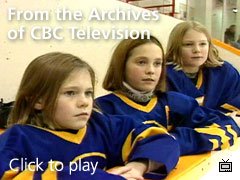
09 She Shoots, She Scores

She shoots, she scores
Hockey was, at the beginning, gender blind. Then along came professionalism and all its rules, the first of which was "No girls allowed." But, after decades of being relegated to the role of cheerleader, women are charging onto the ice in record numbers. Now, as the national women's team heads to Nagano for its first-ever Olympics, the question is: Can a professional women's team be far behind? Team Canada coach Shannon Miller doesn't think so.
"You know, we're real good," Miller says of her World Cup champions. Women's hockey and basketball, she later adds, may be the hottest sports in the world right now. Hockey Night in Canada commentator Don Cherry is a fan, saying: "They give it 100 per cent." The future seems bright but it's all too late for two stars of the 1930s Preston Rivulettes. They were just as good as these Olympians, the former stars say, and every bit as tough.
Did You Know?
- The Canadian women's Olympic team, which in this clip were about to go to the Nagano Olympics as the heavy favourite, had to settle for a silver medal. The Canadians lost 3-1 to the American squad in the final. After the medal ceremony, Canadian coach Shannon Miller told Canadian Press: "I had a feeling of joy because an Olympic medal was being hung on a female hockey player. I couldn't believe how happy it made me."
- The women's Team Canada got its revenge on the Americans in the 2002 Winter Olympics in Salt Lake City. The Canadians beat the Americans 3-2, ending the Games with a perfect 5-0 record. "These girls are role models, not just for this sport," said Canadian coach Danièle Sauvageau. "They're role models for girls and human beings."
- The Preston Rivulettes, mentioned in this clip, were an astonishingly successful women's team formed in southwestern Ontario in 1930. Playing other female teams from Ontario, the Rivulettes logged an estimated 350 games, winning all except for three ties and two losses.
- The earliest known photograph of women playing hockey was taken at Rideau Hall in Ottawa in 1890. The stickhandlers on Governor General Lord Stanley's rink include his daughter, Lady Isobel Stanley. The photo is displayed on the Library and Archives Canada website in the Women's Hockey section of a feature called Backcheck: A Hockey Retrospective.
- Many Canadian women are responsible for breaking down the gender barrier in hockey that loomed large after the Second World War. They include Abby Hoffman, a nine-year-old star defenceman for a Toronto team who disguised herself as a boy to play. For more on Abby, see the He's a girl! clip in the topic Fair Game: Pioneering Women in Canadian Sports.
- Manon Rheaume, who played on the national team featured in this clip, made history in 1992 as the first woman to play professional hockey. The goalie played for the Tampa Bay Lightning during an exhibition game against the St. Louis Blues. For more, see the clip Making hockey history from the topic Fair Game: Pioneering Women in Canadian Sports.
CREDITS
Medium: Television
Program: The Journal
Broadcast Date: Jan. 16, 1998
Host: Hana Gartner, Reporter: Carol OffGuest(s): Don Cherry, Elizabeth Etue, Shannon Miller, Gladys Pitcher, Hilda Ranscombe
Duration: 5:29
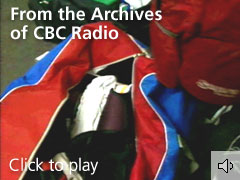
10 That hockey bag smell

That hockey bag smell
You unzip your bag, the smell of wet gear rises up and your teammates drop like flies. A hint? The eye-watering stench of years-old sweat is part of hockey, we hear in this CBC Radio clip. An Edmonton mom who borrowed her husband's gear to play in a mother-son tournament was disgusted. "It was so gross," she says of equipment that hadn't seen soap in 23 years. Help is on the way, however, in the form of a specially built washing machine.
Did You Know?
- In early 2004, a Sarnia, Ont., Grade 9 student won a science fair with his project, What's Growing in Your Hockey Bag. Michael Slotwinski collected material from his hockey gear and put it in a petri dish to show how bacteria will grow in a closed, moist environment like a hockey bag. A more detailed analysis by a University of Calgary lab found several types of germs on used gear.
- A company called Esporta Wash Systems Inc., based in Kelowna, B.C., and franchised in several cities, has had success selling washing machines for hockey equipment.• A Grade 6 student in Edmonton, Larry J. Filipow, won a prize for hockey haiku poetry in 2004 with: "Stale sweat and cat pee/ Smells from teammate's hockey bag/ Marks our boundaries."
CREDITS
Medium: Radio
Program: The Inside Track
Broadcast Date: Dec. 21, 2003
Host: Robin Brown, Reporter: Rod Kurtz
Duration: 5:34
The language of hockey
How does a mosquito turn into a bantam? Can it happen in an ice palace? And what does it look like when an atom does a spinarama? In this CBC Television clip, language expert Katherine Barber stickhandles us through the many hockey words that have seeped into Canadian parlance. Even parliamentarians can't resist dropping the gloves and facing off over a colleague who's been sent to the penalty box.
Did You Know?
- In the Ontario legislature, which is featured in this clip, the phrase "penalty box" was used by members nine times between 1991 and 2004, according to the Hansard record. A similar search for the federal parliament turned up 32 uses of "penalty box."
- For example, in 2002, Mac Harb, then chair of a subcommittee on trade disputes, said in the House of Commons: "What if you have some sort of a penalty box system? If a country commits an offence, it is put on the outside; it can't complain to the WTO, or through whatever dispute mechanism there may be, for a two or three years or whatever."
- Among the hockey words that have made it into The Canadian Oxford Dictionary is "deke." The move is described as: "a fake shot or movement done to draw a defensive player out of position and thus create a better opportunity to score."
- A 1990 newspaper survey of lingo peculiar to Montreal Canadiens dressing room turned up the following: a howitzer (hard shot); buggywhips (skinny legs); a rocko (a goon, short for "rockhead"); a Sawchuk (a shutout, as in goalie Terry); biscuit (puck); and zippers (scars).
- Katherine Barber, who hosts this clip, is editor-in-chief of the Canadian Oxford Dictionary. As well as her appearances on CBC Television programs, she has appeared on CBC Radio as the "Word Lady."
CREDITS
Medium: Television
Program: The National Magazine
Broadcast Date: May 22, 2000
Reporter: Katherine Barber
Duration: 3:32
Stephenville, N.L. ~ Hockey Day in Canada 2006
Hockey Day in Canada heads to Stephenville, N.L.
BY SIGNA BUTLER CBC SPORTS ONLINE
"Hello Canada and hockey fans from the United States and Newfoundland."
The late Foster Hewitt's famous phrase will come to life on Jan. 7, 2006, when the town of Stephenville, N.L., plays host to CBC's Hockey Day in Canada.
Stephenville, a community of 8,000 people on the west coast of Newfoundland, is the official host location for CBC's sixth-annual event.
Hockey Day has become somewhat of an unofficial holiday for Canadian hockey fans.
This year's 13.5-hour broadcast showcases our game at the grassroots level, highlighting how hockey defines both the parent-child and adult-child relationship.
Stephenville won't be the only Canadian community bustling with action. Hockey Day will also carry remote video feeds from Florenceville, N.B., Parry Sound, Ont., Winkler, Man., Calgary, Alta., and Burnaby, B.C.
Former Toronto Maple Leaf forward Wendell Clark will join hosts Ron MacLean, Don Cherry and Dick Irvin in Stephenville for all the festivities, which begin at noon ET.
There is also the traditional NHL all-Canadian tripleheader starting with Ottawa at Montreal at 2 p.m. ET, followed by Toronto at Edmonton at 7 p.m. ET and Calgary at Vancouver at 10 p.m. ET.
Stephenville was chosen host for Hockey Day for its long history with minor, high school, junior B and senior league hockey. Because of its location on the west coast of Newfoundland, Stephenville has natural hockey rivals in the neighbouring communities of Deer Lake, Corner Brook and Port-aux-Basques.
Newfoundland has produced some of the NHL's top, up-and-coming stars such as Michael Ryder of the Montreal Canadiens (Bonavista), Jason King of the Vancouver Canucks (Corner Brook), Dan Cleary of the Detroit Red Wings (Carbonear), Brad Brown of the Toronto Maple Leafs (Baie Verte) and Darren Langdon of the New Jersey Devils (Deer Lake).
The voice of Hockey Night in Canada, Bob Cole, is from St. John's and resides in Topsail, N.L.
The announcement about Hockey Day brings some positive news to Stephenville, which has experienced some tough times in recent months.
In late September, the town declared a state of emergency when heavy rains caused two rivers to spill over their banks, forcing hundreds of residents from their homes. A total of 151 millimetres of rain fell over two days.
More than 150 families were left homeless by the Sept. 28 floods. Insurance companies are not covering claims and the provincial emergency measures organization has limits on the financial aid it can provide.
On Dec. 15, the Abitibi-Consolidated paper mill, which employs 300 people in Stephenville, announced it is permanently closing its operations.
Premier Danny Williams has promised an economic recovery package for those affected by the closure.
The government had been preparing for this fallout since Abitibi-Consolidated announced it would close the newsprint mill in the fall. However, Williams said the province doesn’t have a fully developed economic recovery plan in place because the focus had been on saving the mill.
Previous host locations for Hockey Day in Canada include Shaunavon, Sask. (2004); Iqaluit, Nunavut (2003); Windsor, N.S. (2002); Red Deer, Alta. (2001); and Toronto (2000).
BY SIGNA BUTLER CBC SPORTS ONLINE
"Hello Canada and hockey fans from the United States and Newfoundland."
The late Foster Hewitt's famous phrase will come to life on Jan. 7, 2006, when the town of Stephenville, N.L., plays host to CBC's Hockey Day in Canada.
Stephenville, a community of 8,000 people on the west coast of Newfoundland, is the official host location for CBC's sixth-annual event.
Hockey Day has become somewhat of an unofficial holiday for Canadian hockey fans.
This year's 13.5-hour broadcast showcases our game at the grassroots level, highlighting how hockey defines both the parent-child and adult-child relationship.
Stephenville won't be the only Canadian community bustling with action. Hockey Day will also carry remote video feeds from Florenceville, N.B., Parry Sound, Ont., Winkler, Man., Calgary, Alta., and Burnaby, B.C.
Former Toronto Maple Leaf forward Wendell Clark will join hosts Ron MacLean, Don Cherry and Dick Irvin in Stephenville for all the festivities, which begin at noon ET.
There is also the traditional NHL all-Canadian tripleheader starting with Ottawa at Montreal at 2 p.m. ET, followed by Toronto at Edmonton at 7 p.m. ET and Calgary at Vancouver at 10 p.m. ET.
Stephenville was chosen host for Hockey Day for its long history with minor, high school, junior B and senior league hockey. Because of its location on the west coast of Newfoundland, Stephenville has natural hockey rivals in the neighbouring communities of Deer Lake, Corner Brook and Port-aux-Basques.
Newfoundland has produced some of the NHL's top, up-and-coming stars such as Michael Ryder of the Montreal Canadiens (Bonavista), Jason King of the Vancouver Canucks (Corner Brook), Dan Cleary of the Detroit Red Wings (Carbonear), Brad Brown of the Toronto Maple Leafs (Baie Verte) and Darren Langdon of the New Jersey Devils (Deer Lake).
The voice of Hockey Night in Canada, Bob Cole, is from St. John's and resides in Topsail, N.L.
The announcement about Hockey Day brings some positive news to Stephenville, which has experienced some tough times in recent months.
In late September, the town declared a state of emergency when heavy rains caused two rivers to spill over their banks, forcing hundreds of residents from their homes. A total of 151 millimetres of rain fell over two days.
More than 150 families were left homeless by the Sept. 28 floods. Insurance companies are not covering claims and the provincial emergency measures organization has limits on the financial aid it can provide.
On Dec. 15, the Abitibi-Consolidated paper mill, which employs 300 people in Stephenville, announced it is permanently closing its operations.
Premier Danny Williams has promised an economic recovery package for those affected by the closure.
The government had been preparing for this fallout since Abitibi-Consolidated announced it would close the newsprint mill in the fall. However, Williams said the province doesn’t have a fully developed economic recovery plan in place because the focus had been on saving the mill.
Previous host locations for Hockey Day in Canada include Shaunavon, Sask. (2004); Iqaluit, Nunavut (2003); Windsor, N.S. (2002); Red Deer, Alta. (2001); and Toronto (2000).
Wayne Gretzky - captain for the Oilers Megastar
Gretzky excited to wear No. 99 again
WebPosted Fri Nov 21 10:59:35 2003
CBC SPORTS ONLINE - It just makes sense: Wayne Gretzky in an Edmonton Oilers jersey.
On Saturday, Gretzky will slip on his famous No. 99 jersey, tuck it deep into his hockey pants, and lead his Oiler pals onto the ice for a game of outdoor shinny.
"It's going to be a lot of fun and it will be great to see a lot of old faces and a lot of old friends and old teammates," said Gretzky.
Oilers greats like Gretzky, Paul Coffey, Jari Kurri, Grant Fuhr and Mark Messier will face off against a team of former Montreal Canadiens stars including Guy Lafleur, Steve Shutt, Guy Lapointe, Claude Lemieux and Larry Robinson in the Heritage Classic alumni game (CBC 4:30 pm ET).
"We have been talking about it, we are all looking forward to playing the game."
Retired for nearly five years, the NHL's all-time assist leader has always taken a pass when asked to participate in old-timers games.
But when Oilers general manager Kevin Lowe called and described what was being planned, Gretzky felt compelled to suspend his long-standing policy.
"It's just such a unique situation," said Gretzky of the game, which will be played outdoors on a rink constructed in the middle of Edmonton's Commonwealth Stadium before close to 60,000 fans.
"I really think this is something the city of Edmonton is going to be very proud of and something that's going to be talked about for a lot of years."
The idea of playing outdoors also appealed to the boy that learned the game on a backyard rink built by his father in Brantford, Ont.
"We all kind of grew up outdoors," said Gretzky.
"Kids who grew up dreaming of one day playing in the NHL," he said," now you have an opportunity where guys that played in Edmonton, guys that played in Montreal, are actually going to be out on the ice outdoors."
Another factor motivating Gretzky to take to the ice is family.
"My youngest guy never even saw me play hockey. It'll be outside and being this kind of a thing, it'll be pretty cool," he explained.
"My family and my friends, a lot of people that I know, never saw me in an Oiler uniform."
The last time fans in Edmonton witnessed that was 15 years ago. Gretzky had just led the Oilers to their fourth Stanley Cup championship. He sat at centre ice cradling the Cup as his teammates celebrated around him.
That summer, then-Oilers owner Peter Pocklington did the unthinkable -- he traded Gretzky to the Los Angeles Kings.
The trade proved to be a watershed for No. 99 and the NHL. No longer was Gretzky the skinny kid from Brantford playing Canada's game. Instead, he became a symbol for the growth of hockey in the United States.
He broke Gordie Howe's all-time scoring record while wearing a Kings' jersey. His emotional farewell to the game came in a New York Rangers' blueshirt.
In fact, some argue Gretzky accomplished so much while in playing in the United States that those early seasons with the Oilers, when he was most productive, have been obscured.
"I just thought that probably it was only fitting that I play one more game and my kids had an opportunity to see me in an Oiler uniform," said Gretzky.
Gretzky retired from hockey following the 1998-99 season, but has never strayed too far from the game.
He's part owner of the Phoenix Coyotes. Gretzky built the Canadian team that won gold at the Salt Lake City Winter Olympics. And now he's been charged with assembling Team Canada for the World Cup of Hockey next September.
To keep in shape, Gretzky says he runs and lifts weights. It was only recently that he started playing hockey again.
"I didn't play for a couple of years. Actually, I just started skating in the last 10 to 12 months."
When asked how his game is, the nine-time NHL MVP said bluntly: "I'm no good.
"I'm 42 and I hope the people of Edmonton aren't expecting me to play with the hands and legs of a 22-year-old because it isn't going to happen.
"I'm not going to embarrass myself out there but, trust me, I'm not very good."
Fans will also notice that Gretzky won't be sporting his famous, and flimsy, Jofa helmet.
"I'm not going to wear a helmet," Gretzky said. "I don't think any of our guys are. I don't need a helmet for this game, I don't anticipate getting hit."
And don't expect to ever see No. 99 play an old-timers game again.
"This will be my last game," Gretzky said.
- with files from Canadian Press
WebPosted Fri Nov 21 10:59:35 2003
CBC SPORTS ONLINE - It just makes sense: Wayne Gretzky in an Edmonton Oilers jersey.
On Saturday, Gretzky will slip on his famous No. 99 jersey, tuck it deep into his hockey pants, and lead his Oiler pals onto the ice for a game of outdoor shinny.
"It's going to be a lot of fun and it will be great to see a lot of old faces and a lot of old friends and old teammates," said Gretzky.
Oilers greats like Gretzky, Paul Coffey, Jari Kurri, Grant Fuhr and Mark Messier will face off against a team of former Montreal Canadiens stars including Guy Lafleur, Steve Shutt, Guy Lapointe, Claude Lemieux and Larry Robinson in the Heritage Classic alumni game (CBC 4:30 pm ET).
"We have been talking about it, we are all looking forward to playing the game."
Retired for nearly five years, the NHL's all-time assist leader has always taken a pass when asked to participate in old-timers games.
But when Oilers general manager Kevin Lowe called and described what was being planned, Gretzky felt compelled to suspend his long-standing policy.
"It's just such a unique situation," said Gretzky of the game, which will be played outdoors on a rink constructed in the middle of Edmonton's Commonwealth Stadium before close to 60,000 fans.
"I really think this is something the city of Edmonton is going to be very proud of and something that's going to be talked about for a lot of years."
The idea of playing outdoors also appealed to the boy that learned the game on a backyard rink built by his father in Brantford, Ont.
"We all kind of grew up outdoors," said Gretzky.
"Kids who grew up dreaming of one day playing in the NHL," he said," now you have an opportunity where guys that played in Edmonton, guys that played in Montreal, are actually going to be out on the ice outdoors."
Another factor motivating Gretzky to take to the ice is family.
"My youngest guy never even saw me play hockey. It'll be outside and being this kind of a thing, it'll be pretty cool," he explained.
"My family and my friends, a lot of people that I know, never saw me in an Oiler uniform."
The last time fans in Edmonton witnessed that was 15 years ago. Gretzky had just led the Oilers to their fourth Stanley Cup championship. He sat at centre ice cradling the Cup as his teammates celebrated around him.
That summer, then-Oilers owner Peter Pocklington did the unthinkable -- he traded Gretzky to the Los Angeles Kings.
The trade proved to be a watershed for No. 99 and the NHL. No longer was Gretzky the skinny kid from Brantford playing Canada's game. Instead, he became a symbol for the growth of hockey in the United States.
He broke Gordie Howe's all-time scoring record while wearing a Kings' jersey. His emotional farewell to the game came in a New York Rangers' blueshirt.
In fact, some argue Gretzky accomplished so much while in playing in the United States that those early seasons with the Oilers, when he was most productive, have been obscured.
"I just thought that probably it was only fitting that I play one more game and my kids had an opportunity to see me in an Oiler uniform," said Gretzky.
Gretzky retired from hockey following the 1998-99 season, but has never strayed too far from the game.
He's part owner of the Phoenix Coyotes. Gretzky built the Canadian team that won gold at the Salt Lake City Winter Olympics. And now he's been charged with assembling Team Canada for the World Cup of Hockey next September.
To keep in shape, Gretzky says he runs and lifts weights. It was only recently that he started playing hockey again.
"I didn't play for a couple of years. Actually, I just started skating in the last 10 to 12 months."
When asked how his game is, the nine-time NHL MVP said bluntly: "I'm no good.
"I'm 42 and I hope the people of Edmonton aren't expecting me to play with the hands and legs of a 22-year-old because it isn't going to happen.
"I'm not going to embarrass myself out there but, trust me, I'm not very good."
Fans will also notice that Gretzky won't be sporting his famous, and flimsy, Jofa helmet.
"I'm not going to wear a helmet," Gretzky said. "I don't think any of our guys are. I don't need a helmet for this game, I don't anticipate getting hit."
And don't expect to ever see No. 99 play an old-timers game again.
"This will be my last game," Gretzky said.
- with files from Canadian Press
